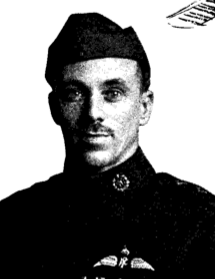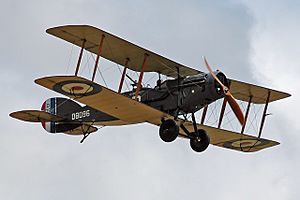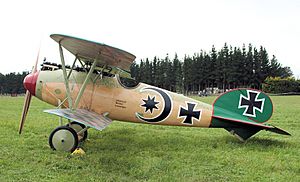John Herbert Hedley facts for kids
Quick facts for kids
John Herbert Hedley
|
|
|---|---|
 |
|
| Nickname(s) | The Luckiest Man Alive |
| Born | 19 July 1887 North Shields, Northumberland, England |
| Died | 1 April 1977 (aged 89) Los Angeles, California, United States |
| Allegiance | |
| Service/ |
|
| Years of service | 1914–1918 |
| Rank | Captain |
| Unit | Northumberland Fusiliers 26th Battalion (3rd Tyneside Irish) Army Cyclist Corps Lincolnshire Regiment (17th Labour Company) Labour Corps No. 62 Squadron Royal Flying Corps No. 20 Squadron Royal Flying Corps No. 20 Squadron RAF |
| Awards | French Croix de Guerre |
| Other work | Accountant, speaker, lawyer |
Captain John Herbert Hedley (born July 19, 1887 – died April 1, 1977) was a brave British pilot during World War I. He was known as a flying ace, meaning he shot down many enemy aircraft. Hedley earned the nickname "The Luckiest Man Alive" after surviving an incredible incident in the sky. He also survived being shot down in 1918 and became a prisoner of war. After the war, he moved to the United States and became a popular speaker, sharing his amazing wartime stories.
Contents
Early Life in England
John Herbert Hedley was born in North Shields, England, on July 19, 1887. He was the oldest of three sons. His father worked in a shipyard, and his mother ran a small shop.
Sadly, John's father passed away when John was 13. His mother also died a few years later. By 1911, John was working as an accountant's clerk. In 1912, he married Isabella C. Sands. Their son, John Herbert Hedley, Jr., was born in 1914, just as World War I began.
Becoming a World War I Flying Ace
John Hedley joined the British Army on August 4, 1914, at the start of World War I. He served in several different units, including the Northumberland Fusiliers. Later, he transferred to the Royal Flying Corps, which was the air force at the time.
In November 1917, Hedley joined No. 20 Squadron. He became an observer in a Bristol F.2b plane. As an observer, his job was to spot enemy aircraft and operate the machine gun. He became a flying ace, credited with eleven aerial victories. This means he helped shoot down or disable eleven enemy planes or balloons.
The Luckiest Man Alive Story
John Hedley earned his famous nickname, "The Luckiest Man Alive," from a war reporter named Floyd Gibbons. Hedley told an amazing story about a flight in early 1918. During a fight with German planes, his pilot, Reginald Makepeace, made a very sudden dive.
Hedley claimed he was thrown out of the plane! But, incredibly, he said he was caught in the air currents and somehow grabbed onto the plane's tail. He then managed to climb back into his seat. Both he and his pilot were shaken but landed safely. This incredible tale made him famous.
Shot Down and Prisoner of War
On March 27, 1918, Captain Hedley and his pilot, Robert Kirby Kirkman, were flying their Bristol F.2b. They were shot down by a German pilot named Leutnant Karl Gallwitz. Luckily, both Hedley and Kirkman survived the crash without injuries.
However, they were captured and became prisoners of war. For many years, people mistakenly thought they had been shot down by the famous German pilot, Manfred von Richthofen, also known as the Red Baron. This was later proven to be incorrect.
Hedley received the French Croix de Guerre, a military award for bravery. He spent the rest of 1918 in a German prisoner of war camp. He was finally sent back to England in December 1918.
Life After the War
After returning to England, John Hedley's second son was born in 1920. Later that year, Hedley moved to the United States. His wife and children joined him in 1921. They settled in Chicago, Illinois, where John became a U.S. citizen in 1926.
A Popular Speaker
In the 1920s and early 1930s, John Hedley became a very successful speaker. He traveled around America, telling audiences his thrilling war stories. His most popular lecture was called Rambling Through the Air.
He often shared the amazing story of being thrown from his plane and climbing back in. He also talked about his time as a prisoner of war. Newspaper reviews often praised his exciting talks.
By 1930, John Hedley was working as a lawyer. Later in life, he became a retired accountant. John Herbert Hedley passed away in Los Angeles, California, on April 1, 1977. Even after his death, his incredible story continues to be shared in books and videos.
Images for kids
 | Percy Lavon Julian |
 | Katherine Johnson |
 | George Washington Carver |
 | Annie Easley |




